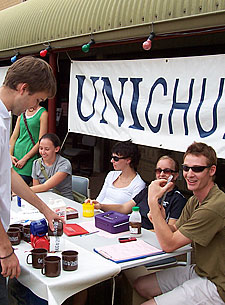O-Week has come and gone for Charles Sturt University's Wagga campus but there is still debate over whether the absence of the campus's Christian group was fair.
Your.sydneyanglicans.net reported a fortnight ago in the story No-Go-Week for Christian O-Week that there was a blanket ban on all clubs during the university's O-Week, including the student Christian Fellowship (CF), meaning Christian students were not allowed to recruit students on the university grounds during O-Week.
CF's senior AFES staff worker Richard Wilson says the O-Week has traditionally been a critical time for making contact with new students and was hoping to overturn the ban.
However, the head of the residential Anglican College at Charles Sturt University in Wagga Wagga has since responded to the story saying the decision was taken for student welfare reasons and has been a "positive' for her ministry to new residential students from the bush.
The Rev Jenny Willsher says a major reason behind the decision was "a number of incidents in previous years that have been extremely distressing for the students involved".
Your.sydneyanglicans.net understands some clubs had taken students off-site under false pretences, ran initiations or alcohol-fuelled events which put new students at risk.
 "I am actually quite supportive of the ban as it has enabled St Martin's College to run an effective orientation program for our students without them being drawn away to other activities," Ms Willsher says.
"I am actually quite supportive of the ban as it has enabled St Martin's College to run an effective orientation program for our students without them being drawn away to other activities," Ms Willsher says.
"St Martin's College welcomed 28 new students during O-Week this year, 95 per cent of whom were from rural areas moving away from home for the first time and an overwhelming number of these students are active Christians."
Ms Willsher is encouraging people to get behind the university's decision.
"Charles Sturt University needs to be supported and encouraged in the many steps it takes to care for and support young people in O-Week, rather than criticised."
She also claims the policy will not negatively impact the ministry of the Christian students.
"There were ample opportunities for clubs to advertise, both in the official orientation booklet as well as with leaflets in the orientation bags," Ms Willsher explains.
"I think this is an appropriate level of operation in what is a long, draining week for new students. Rather than being a "negative effect' as reported, this move by the university has in fact had an extremely positive effect this week."
Christian fellowship regroups
Mr Wilson and a team of CF students used the designated clubs day as an opportunity for making contacts with new students.
"The clubs day was a good day. We made many new contacts and possibly contacted the people on Clubs Day who we normally would have contacted during O-Week," he says.
"It probably just changed when and where we met the new students."
However, Mr Wilson would still prefer a return to the time when clubs had an O-Week presence.
"The new policy is workable but I am not convinced it's the best thing for all clubs," he says.
"The unknown factor is whether there are other students around who would like to have joined us at O-Week but who haven't found us yet. Also, the lack of consultation by the SRC with clubs before the decision was not helpful for good communication."
In a piece written by AFES National Director Richard Chin for the upcoming issue of AFES' magazine SALT, he lists why Australian universities have become a harder place for Christian ministry.
"The disintegration of the common lunch hour, shortened semesters and the rise of the part-time job and commercialism [mean the] campus is seen as an avenue to a job rather than a place of genuine learning in relationship. In this context, the hurdles to our mission are numerous," Mr Chin writes.
However, Assistant Anglican Chaplain to Sydney University, the Rev Dr Rowan Kemp, says unlike other campus groups, the Evangelical Union still has an "open door" and a "vibrant O-Week where the union wants lots of students on campus, which works in our favour".
Mr Wilson is hoping that continued discussion between the clubs and the SRC will find a way forward that will benefit all clubs.
"Judging by what most other campuses do, having clubs present during O-Week can work well," Mr Wilson says.
"We would like to come up with something that is beneficial for all concerned " the students, the university and clubs."
Nonetheless, the academic year is underway at CSU Wagga and Mr Wilson is pressing ahead, planning a public meeting talk on Jesus and global warming for this week.
"I want to engage with current issues and ask what Jesus would say about them."



























